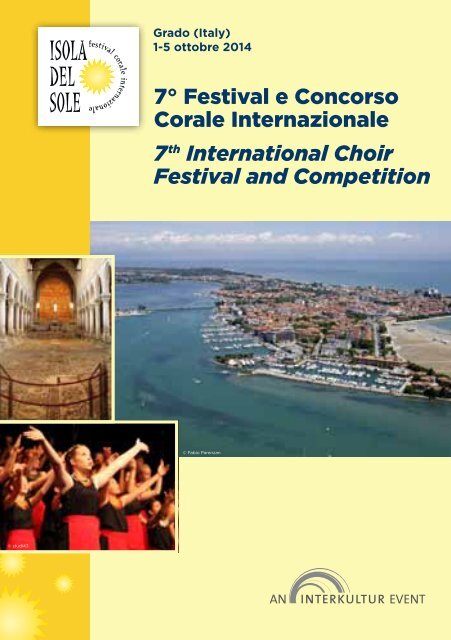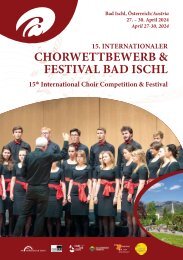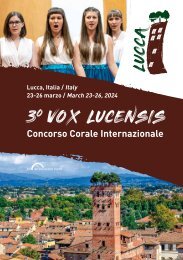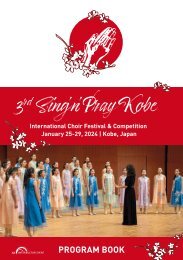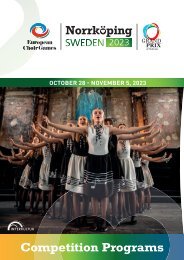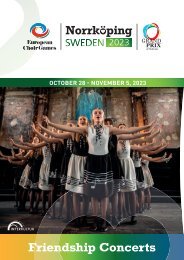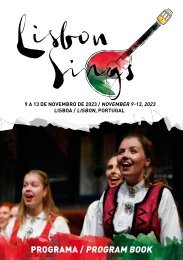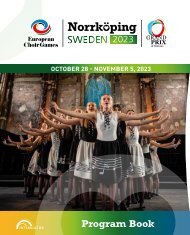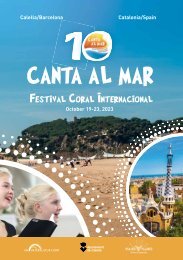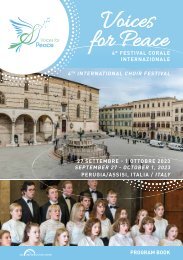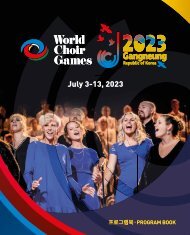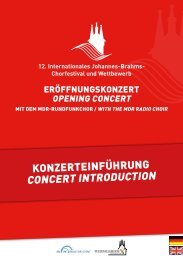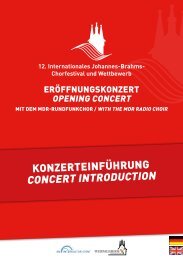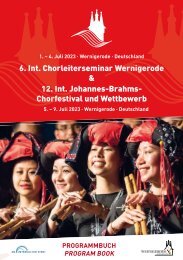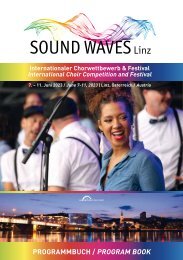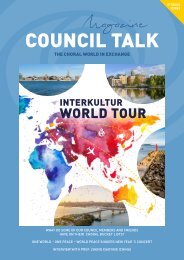Isola del Sole 2014 - Program Book
Program Book of "Isola del Sole" - Int. Choir Competition and Festival 2014 The "Sunny Island" Grado is the ideal place for a meeting of international choir. Its numerous venues, short paths in the historic part of town, its top tourist destinations, as well as its location between Venice and Trieste, make Grado the perfect event venue. What is more, performances in the Basilica di Sant‘Eufemia in Grado and the Basilica di Aquileia promise a unique experience of choral music. In addition to the concept of the past events in Grado, the 2014 Festival will give a special focus to the pedagogical activities. The new INTERKULTUR event will feature not only the traditional components such as the choir competition and the international Friendship Concerts, but also the evaluation concerts and individual coaching.
Program Book of "Isola del Sole" - Int. Choir Competition and Festival 2014
The "Sunny Island" Grado is the ideal place for a meeting of international choir. Its numerous venues, short paths in the historic part of town, its top tourist destinations, as well as its location between Venice and Trieste, make Grado the perfect event venue. What is more, performances in the Basilica di Sant‘Eufemia in Grado and the Basilica di Aquileia promise a unique experience of choral music.
In addition to the concept of the past events in Grado, the 2014 Festival will give a special focus to the pedagogical activities. The new INTERKULTUR event will feature not only the traditional components such as the choir competition and the international Friendship Concerts, but also the evaluation concerts and individual coaching.
Create successful ePaper yourself
Turn your PDF publications into a flip-book with our unique Google optimized e-Paper software.
Grado (Italy)<br />
1-5 ottobre <strong>2014</strong><br />
7° Festival e Concorso<br />
Corale Internazionale<br />
7 th International Choir<br />
Festival and Competition<br />
© Fabio Parenzan<br />
© studi43
INTERKULTUR EVENTS<br />
Registration Deadline:<br />
OCT 27, <strong>2014</strong><br />
Early Bird: SEP 8, <strong>2014</strong><br />
Registration Deadline:<br />
OCT 20, <strong>2014</strong><br />
Early Bird: SEP 1, <strong>2014</strong><br />
Registration Deadline:<br />
NOV 24, <strong>2014</strong><br />
Early Bird: SEP 15, <strong>2014</strong><br />
Registration Deadline:<br />
DEC 1, <strong>2014</strong><br />
Early Bird: SEP 29, <strong>2014</strong><br />
Registration Deadline:<br />
JAN 12, 2015<br />
Early Bird: OCT 27, <strong>2014</strong><br />
International Choir Competition &<br />
Festival Bad Krozingen<br />
Canta en Primavera – Málaga 2015<br />
Festival Coral Internacional<br />
VOCI DAL LIDO 2015<br />
1 st International Choir Festival<br />
4 th Vietnam International<br />
Choir Competition – Hội An 2015<br />
5 th International Anton Bruckner<br />
Choir Competition & Festival<br />
March 4 – 8, 2015<br />
Bad Krozingen, Germany<br />
03<br />
March 11 – 15, 2015<br />
Málaga, Spain<br />
03<br />
April 8 – 12, 2015<br />
Jesolo, Italy<br />
04<br />
April 29 – May 3, 2015<br />
Hội An, Vietnam<br />
04<br />
June 3 – 7, 2015<br />
Linz, Austria<br />
06<br />
Registration Deadline:<br />
FEB 16, 2015<br />
Early Bird: NOV 17, <strong>2014</strong><br />
Registration Deadline:<br />
MAR 2, 2015<br />
Early Bird: DEC 8, <strong>2014</strong><br />
2<br />
nd European Choir Games<br />
& Grand Prix of Nations<br />
International Johannes Brahms<br />
Choir Festival & Competition<br />
July 5 – 12, 2015<br />
Magdeburg, Germany<br />
07<br />
July 15 – 19, 2015<br />
Wernigerode, Germany<br />
07<br />
Puccini International Choir Festival<br />
Choir Competition & Festival Torre <strong>del</strong> Lago Puccini, Italy<br />
09<br />
KALAMATA 2015<br />
International Choir Competition & Festival<br />
CANTA AL MAR 2015<br />
4 th Festival Coral Internacional<br />
September 30 – October 3, 2015<br />
October 14 – 18, 2015<br />
Kalamata, Greece<br />
10<br />
October 21 – 25, 2015<br />
Calella & Barcelona, Spain10<br />
Photo Credits: 1 © Studio 43 | 2 © INTERKULTUR | 3 © Kevin Husted<br />
INTERKULTUR · Ruhberg 1 · 35463 Fernwald (Frankfurt / Main) Germany<br />
Phone: +49 (0) 6404 69749-25 · Fax: +49 (0) 6404 69749-29 · e-mail: mail@interkultur.com · www.interkultur.com
7° Festival e Concorso Corale Internazionale<br />
“ISOLA DEL SOLE”, Grado, 1 - 5 ottobre <strong>2014</strong><br />
Organizzatori – Organizers<br />
INTERKULTUR<br />
In collaborazione con - In cooperation with<br />
Promhotels 2001 Srl<br />
Patrocinio - Patronage<br />
Comune di Grado - Municipality of Grado<br />
Presidente di INTERKULTUR - President INTERKULTUR<br />
Günter Titsch (Germania, Germany)<br />
Comitato artistico - Artistic committee<br />
Prof. Giovanni Acciai (Italia, Italy)<br />
Prof. Dr. Ralf Eisenbeiß (Germania, Germany)<br />
Christian Ljunggren (Svezia, Sweden)<br />
Interkultur Board<br />
Günter Titsch (Germania, Germany)<br />
Wang Qin (Cina, China)<br />
Stefan Bohländer (Germania, Germany)<br />
Prof. Dr. Ralf Eisenbeiß (Germania, Germany)<br />
Direzione organizzativa – Project Manager<br />
Rossana Toesco (Italia, Italy)
4<br />
Indice - Table of Content<br />
Nazionalità dei cori partecipanti – Nationality of the participating choirs. ........... pag. 5<br />
Saluti - Greetings......................................................... pag. 7<br />
Organizzatori - Organizers ................................................. pag. 15<br />
Comitato artistico – Artistic committee ....................................... pag. 23<br />
Giuria – Jury ............................................................ pag. 31<br />
<strong>Program</strong>ma generale – General schedule ..................................... pag. 39<br />
<strong>Program</strong>ma <strong>del</strong> concorso – Competition program............................... pag. 47<br />
Workshop............................................................... pag. 54<br />
Cori partecipanti – Participating choirs . . . . . . . . . . . . . . . . . . . . . . . . . . . . . . . . . . . . . . . . pag. 57<br />
Team. .................................................................. pag. 66
5<br />
Nazioni dei cori partecipanti - Nations of the Participating choirs<br />
1. BIH Bosnia Herzegovina – Bosnia and Herzegovina<br />
2. D Germania – Germany<br />
3. H Ungheria - Hungary<br />
4. I Italia – Italy<br />
5. LT Lituania – Lithuania<br />
6. PRC Repubblica Popolare Cinese – People’s Republic of China<br />
7. RI Indonesia - Indonesia<br />
8. RUS Russia - Russia<br />
9. S Svezia – Sweden<br />
10. SLO Slovenia – Slovenia<br />
11. WAN Nigeria – Nigeria<br />
© studi43
7<br />
SALUTI<br />
GREETINGS
8<br />
Edoardo Maricchio<br />
Sindaco di Grado<br />
Mayor of Grado<br />
Saluto <strong>del</strong>la Città di Grado<br />
Sono particolarmente lieto di porgere il caloroso benvenuto<br />
<strong>del</strong>la Città di Grado e <strong>del</strong>l’Amministrazione comunale<br />
a tutti i partecipanti al 7° Festival Corale Internazionale<br />
“<strong>Isola</strong> <strong>del</strong> <strong>Sole</strong>” che si terrà dall’1 al 5 ottobre <strong>2014</strong>.<br />
E’ un grande onore per la nostra città, che vanta un’antica<br />
tradizione canora, ospitare nuovamente una manifestazione<br />
così prestigiosa che vedrà riuniti gruppi corali provenienti<br />
da diversi paesi <strong>del</strong> mondo.<br />
Questo importante appuntamento contribuisce a diffondere<br />
la musica canora nelle sue molteplici forme e favorisce<br />
incontri ed amicizie, superando barriere culturali, sociali<br />
e linguistiche.<br />
Nei quattro giorni <strong>del</strong> Concorso il canto si sentirà in ogni<br />
angolo <strong>del</strong>la nostra città e sono certo che i gradesi seguiranno<br />
con particolare interesse e simpatia le vostre<br />
esibizioni.<br />
Auspicando di poter ospitare questa bellissima manifestazione<br />
anche nei prossimi anni, auguro a tutti voi un sereno<br />
soggiorno sulla nostra isola.<br />
I am very pleased to welcome, in the name of the city of<br />
Grado and the municipal administration, all participants at<br />
the 7th International Choral Festival “Island of the Sun”,<br />
which will be held from 1 to 5 October <strong>2014</strong>.<br />
It is a great honor for our city, with an ancient tradition of<br />
singing, to host such a prestigious event that will bring<br />
together choral groups from all different countries of the<br />
world.<br />
This important event helps to spread the melodious music<br />
in its many forms and encourages encounters and friendships,<br />
overcoming cultural barriers, social and language<br />
skills.<br />
During the four days of the competition this music will be<br />
heard in every corner of our city and I am sure that the<br />
Grado’s people will follow with great interest and sympathy<br />
your performances.<br />
Hoping to host this wonderful event again in the next years,<br />
I wish you all a pleasant stay on our Island.
© Alessandro Castiglioni
10<br />
Günter Titsch<br />
Presidente di Interkultur<br />
President of Interkultur<br />
Cari amici di INTERKULTUR,<br />
Desidero darvi un caloroso benvenuto alla settima edizione<br />
<strong>del</strong> nostro Concorso Corale Internazionale ISOLA DEL<br />
SOLE, che - dopo una lunga pausa - siamo lieti di riproporre<br />
nella sua completezza qui a Grado.<br />
Grado, l’<strong>Isola</strong> <strong>del</strong> <strong>Sole</strong>, con i suoi angoli pittoreschi, i suoi<br />
stretti vicoli nel centro storico e le innumerevoli attrazioni<br />
che la Regione offre tutt’intorno alle bellissime città di<br />
Gorizia, Udine e Trieste, è il luogo ideale per un incontro di<br />
cori internazionali.<br />
La Regione tutta traspira secoli di antiche culture, tra un<br />
magnifico paesaggio lagunare e il mare; i concerti tenuti<br />
nella millenaria Basilica di Aquileia in particolare , promettono<br />
sia agli ascoltatori che agli stessi esecutori momenti<br />
di alta espressione artistica.<br />
Gli ultimi anni sono stati per i festival di INTERKULTUR l’inizio<br />
di una grande espansione: oltre a nuove località che<br />
abbiamo aggiunto via via come sedi <strong>del</strong>le nostre manifestazioni,<br />
ormai sparse in tutto il mondo, abbiamo saputo<br />
conformare e rafforzare sempre più i contenuti in base alle<br />
esigenze e ai desideri che provenivano dai cori stessi.<br />
Così accanto ai concorsi internazionali classici veri e<br />
propri, che costituiscono il biglietto da visita <strong>del</strong>la nostra<br />
Organizzazione ormai da più di due decenni, abbiamo<br />
creato e mo<strong>del</strong>lato svariate proposte pedagogiche, che i<br />
cori possono sfruttare al meglio secondo le loro necessità,<br />
sia che si tratti di prove con valutazione, elaborazioni di<br />
brani con esperti, colloqui individuali con i membri d giuria<br />
oppure seminari. Senza dimenticare l'opportunità di poter<br />
"fare musica" nei concerti di amicizia con cori provenienti<br />
da altre culture, un momento che è divenuto con il tempo<br />
sempre più importante.<br />
Desidero ringraziare tutti coloro che hanno reso possibile<br />
questa manifestazione in particolare i nostri partner locali<br />
<strong>del</strong>la Promhotels e naturalmente il Comune di Grado.<br />
Auguro a tutti i partecipanti giornate dense di ispirazione,<br />
nella prospettiva di un grande ritorno <strong>del</strong> nostro Festival<br />
anche negli anni a venire.<br />
Cordialmente
11<br />
Dear Friends of INTERKULTUR,<br />
Welcome to the 7th International Choir Festival ”<strong>Isola</strong><br />
<strong>del</strong> <strong>Sole</strong>“ in Grado. INTERKULTUR is very happy to have<br />
included this extraordinarily renowned event in its considerable<br />
schedule of events again after a longer interval.<br />
The sun-kissed island of Grado, well-liked and treasured<br />
for its numerous venues, the short distances in a historic<br />
town and the various tourist attractions to be discovered<br />
in and around the cities of Gorizia, Udine and Trieste, is<br />
an ideal place for the encounter of international choirs.<br />
The entire region breathes the close interrelation between<br />
centuries-old culture, the magnificent lagoon landscape<br />
and the sea. Especially the concerts performed at the<br />
Basilica of Aquileia, built more than a thousand years ago,<br />
are an outstanding treat for audience and singers alike to<br />
experience fascinating artistic and emotional moments.<br />
In the course of the last years, the range and character<br />
of music events organized by INTERKULTUR have been<br />
marked by profound developments. Apart from the new<br />
festival venues around the world that we have added to<br />
our list, we have undertaken steps to modify the contents<br />
of the events to match them in an even better way to the<br />
requests and wishes of the choirs.<br />
This means that now the actual international competitions<br />
our organization has been renowned for over the last more<br />
than two and a half decades go along with numerous<br />
training, practise and course-type of offers that choirs<br />
may make use of according to their interests and needs.<br />
In any case, all offers are designed to be of tremendous<br />
benefit to all participants, no matter whether they go for<br />
counselling sessions, private rehearsals guided by experts,<br />
choir director meetings or workshops. And not to forget<br />
the fascinating opportunities provided by our friendship<br />
concerts, namely to meet and get to know singers from<br />
other choirs and cultures around the globe and to sing and<br />
make music together with them – a feature of our events<br />
we are very glad to have been providing more room for for<br />
quite some time.<br />
I would like to express my sincere gratitude to all the<br />
persons that have given their very best to make this event<br />
possible, our Partner of Promhotels and of course the Town<br />
Hall of Grado.<br />
I wish all participants wonderful days full of <strong>del</strong>ight and<br />
inspiration at our “<strong>Isola</strong> <strong>del</strong> <strong>Sole</strong>” festival here in Grado<br />
and look forward to a brilliant development of this Festival<br />
in the years to come.<br />
Cordially yours,
March 4 – 8, 2015<br />
Bad Krozingen, Germany<br />
BAD KROZINGEN<br />
Internationaler Chorwettbewerb & Festival<br />
CHORFESTSPIELE<br />
BAD KROZINGEN<br />
International Choir Competition<br />
& Festival<br />
Interkultur<br />
Ruhberg 1<br />
35463 Fernwald (Frankfurt / Main) Germany<br />
phone: +49 (0) 6404 69749-25<br />
fax: +49 (0) 6404 69749-29<br />
e-mail: mail@interkultur.com<br />
badkrozingen.interkultur.com<br />
Scan QR code and get more<br />
information<br />
Photo Credits: left: © Studio43 (top), © Bad Krozingen (below) | right: © Clifford Turrell
© studi43<br />
14
15<br />
Organizzatori<br />
Organizers
16<br />
… costruire ponti per incontrarsi.<br />
Ponti per incontrarsi<br />
Il 1° Concoso Corale di Budapest la cui prima edizione risale al 1988 ha creato una <strong>del</strong>le più importanti manifestazioni<br />
culturali in Europa. La serie di festival internazionali di INTERKULTUR, organizzazione non-profit con sede in<br />
Germania , è ormai denominazione conosciuta a livello mondiale per l’alto livello raggiunto sia sotto il profilo artistico<br />
che organizzativo e punto di riferimento <strong>del</strong>la coralità internazionale che annovera sostenitori in tutto il mondo.<br />
Il maggior successo di INTERKULTUR è stata l’idea di applicare l’antico ideale olimpico al mondo <strong>del</strong>la musica<br />
corale. Da questa idea sono nate le olimpiadi corali <strong>del</strong> 2000 a Linz (Austria), il cui felice esito è stato bissato poi<br />
ogni due anni, in Corea <strong>del</strong> Sud (Busan 2002), a Brema (Germania) nel 2004, a proseguito a Xiamen (Cina) nel 2006<br />
con i World Choir Games, seguito nel 2008 da Graz (Austria) , Shaoxing (Cina) nel 2010, ed infine Cincinnati (USA)<br />
nel 2012. L’ultima edizione si è tenuta nel luglio di quest’anno a Riga (Lettonia), che è stata anche la più grande<br />
in termini di numeri con 27.000 partecipanti. La prossima edizione dei World Choir Games si terrà nel 2016 nella<br />
città olimpica di Sochi in Russia.<br />
Altra pietra miliare raggiunta nella storia di INTERKULTUR è stata la creazione di un campionato mondiale per<br />
formazioni corali la cui prima edizione si è svolta nel 2009 nella Provincia di Gyeongnam (Repubblica di Corea),<br />
seguita dai World Choir Championships for Youth and Young Adults che si sono svolti a Graz (Austria) nel 2011.<br />
Sempre a Graz è stata organizzata nel luglio <strong>del</strong> 2013 anche la prima edizione degli European Choir Games and<br />
the “Songs of Spirit Festival”, la versione europea dei World Choir Games, la cui seconda edizione si svolgerà a<br />
Magdeburg (Germania) nel luglio <strong>del</strong> 2015.<br />
• L’idea<br />
INTERKULTUR è divenuto ormai sinonimo di un concetto artistico unico nel suo genere, poiché ha introdotto una<br />
novità rispetto al passato. Mentre importanti concorsi corali tradizionali sono riservati soltanto a cori appartenenti<br />
a un’élite a livello internazionale, i festival di INTERKULTUR, collocandosi parallelamente alla forma tradizionale,<br />
aprono le porte <strong>del</strong> confronto artistico a tutti i cori desiderosi di vivere l’esperienza <strong>del</strong> concorso e <strong>del</strong> festival in<br />
campo internazionale come momento di crescita. Uno dei valori ai quali il comitato artistico di INTERKULTUR tiene<br />
maggiormente, è che in tutti i concorsi possano trovare spazio sia i migliori gruppi sia la grande varietà di formazioni<br />
corali di tutti i livelli. Questa scelta artistica è stata copiata da numerosi concorsi sorti in questi ultimi anni. Con l’idea<br />
di organizzare ogni due anni i World Choir Games - già conosciuti come Choir Olympics” - INTERKULTUR ha trovato<br />
la direzione che incoraggia il movimento corale internazionale verso nuovi impulsi e prospettive.<br />
• Il marchio di qualità<br />
Da più di un ventennio MUSICA MUNDI® rappresenta l’esclusivo marchio di qualità di tutte le manifestazioni<br />
di INTERKULTUR nel mondo. Sin dal primo festival di INTERKULTUR svoltosi a Budapest nel 1988 il sistema di<br />
valutazione – sul quale si basano tutti i concorsi – è stato perfezionato costantemente. Tutti i concorsi di MUSICA<br />
MUNDI® hanno come comune denominatore la qualità a garanzia <strong>del</strong>la comparabilità rispettando tutti i livelli e<br />
fissando standard nel mondo <strong>del</strong>la musica corale.<br />
• I concorsi<br />
Il nuovo concetto di base si rende concreto nella realizzazione di concorsi che offrono più categorie divise per
17<br />
gradi di difficoltà per tutti i tipi di coro con o senza brani d’obbligo. In essi si vive un’atmosfera unica, in cui si<br />
offrono condizioni di partecipazione vantaggiose, dense occasioni di contatti artistici, interessanti workshops e<br />
consultazioni con esperti prima e dopo la prova in concorso vera e propria. Più di 200 tra esperti e direttori di<br />
coro in campo internazionale garantiscono la competente professionalità che contraddistingue le manifestazioni<br />
di INTERKULTUR.<br />
• Il sistema di valutazione<br />
La giuria assegna nei concorsi di INTERKULTUR diplomi corrispondenti ai dieci livelli nelle fasce oro, argento e<br />
bronzo ed assegna medaglie d’oro, d’argento o di bronzo.ai World Choir Games e World Choir Championships in<br />
base al particolare sistema di valutazione di MUSICA MUNDI®. In ogni categoria si determina un “vincitore” o un<br />
“campione” e a esibizioni di particolare interesse vengono assegnati premi speciali. Alcuni festival contemplano<br />
la competizione riservata ai vincitori di categoria per l’assegnazione <strong>del</strong> gran premio al coro migliore, decretato<br />
così vincitore assoluto <strong>del</strong> concorso.<br />
• La funzione pedagogica<br />
Le manifestazioni di INTERKULTUR non sono solamente concorsi e festival internazionali. Momento di grande<br />
interesse per i partecipanti sono le numerose offerte di perfezionamento fondate su una grande competenza<br />
artistica e pedagogica. Durante la fase <strong>del</strong>la consultazione per esempio, i cori hanno la possibilità di lavorare<br />
insieme a giurie internazionali ricevendo opinioni in merito al livello artistico nonché preziosi consigli pedagogicoartistici<br />
per affrontare meglio l’interpretazione <strong>del</strong> programma scelto. Parallelamente ai concorsi si organizzano<br />
inoltre congressi, seminari corsi di perfezionamento, nonché concerti in amicizia e concerti di gala che offrono ai<br />
partecipanti la possibilità di interagire con I cori <strong>del</strong>la città ospite durante gli incontri internazionali di INTERKULTUR.<br />
• I Paesi ospitanti i nostri festival<br />
I festival di INTERKULTUR si sono svolti in Austria, Cina, Corea <strong>del</strong> Sud, Germania, Indonesia, Israele, Italia, Malesia,<br />
Malta, Repubblica Ceca, Spagna, Svezia, Ungheria, Vietnam e negli USA. Quest’autunno la Serbia ospiterà per la<br />
prima volta un nostro festival (ottobre <strong>2014</strong>).<br />
• I partecipanti<br />
In totale, più di 7.600 cori con più di 340.000 partecipanti provenienti da 100 nazioni hanno preso parte fino ad<br />
oggi ai festival di INTERKULTUR. È interessante notare come più <strong>del</strong>la metà dei partecipanti sia costituita da cori di<br />
bambini e cori giovanili i cui membri hanno meno di 25 anni di età.<br />
• Finalità di sostegno<br />
In virtu’ <strong>del</strong> suo statuto INTERKULTUR persegue le seguenti attività:<br />
• promuovere festival musicali internazionali il cui scopo è di avvicinare cori di diversi paesi e culture<br />
favorendo la collaborazione internazionale attraverso il rispetto reciproco e contribuire così alla<br />
comprensione tra i popoli<br />
• favorire la partecipazione di formazioni corali di bambini e giovanili provenienti da paesi economicamente<br />
deboli, in particolare<br />
• favorire l’attività di cori amatoriali, specialmente di giovani, sia a livello locale o internazionale, che<br />
dimostrano costante sviluppo artistico<br />
• sostenere l’impegno di promettenti direttori di coro, musicisti e coristi con l’assegnazione di buoni studio<br />
• sponsorizzare progetti specifici<br />
• European Culture Award<br />
Nel 2006 la Fondazione INTERKULTUR ha ricevuto l’European Culture Award, riconoscimento iniziato da Hans<br />
Dietrich Genscher ed assegnato dal KulturForum Europa, per l’attività svolta in favore <strong>del</strong>la comprensione tra i<br />
popoli e per il rafforzamento di un comune pensiero europeo nella cultura.
18<br />
… Connecting bridges.<br />
The first INTERKULTUR International Choir Competition in Budapest, held in 1988, was the start of one of the<br />
largest and most successful series of cultural events in Europe. The INTERKULTUR Event Series has meanwhile<br />
become known throughout the world for its high artistic and organizational standards and as a concept for the<br />
choirs and choir enthusiasts worldwide. These events are organized by INTERKULTUR, a non-profit organization<br />
based in Germany.<br />
INTERKULTUR´s biggest success to date was to bring the antique Olympic idea to the choral community. The Choir<br />
Olympics 2000 in Linz, Austria was the beginning of a Choir Olympic movement, with subsequent events in Busan,<br />
Republic of Korea in 2002, and Bremen, Germany in 2004. This success continued as the “World Choir Games” in<br />
Xiamen, China in 2006, Graz, Austria in 2008, Shaoxing, China in 2010, and Cincinnati, USA in 2012. In <strong>2014</strong>, the<br />
World Choir Games were held in Riga, Latvia and marked the biggest event in the history of the choir Olympic idea<br />
attracting 27,000 participants. In 2016, the World Choir Games will come to the Olympic city of Sochi in Russia.<br />
Another milestone in the history of INTERKULTUR was to establish a World Championship for choirs. The first World<br />
Choir Championships debuted in 2009 in the Province of Gyeongnam, Republic of Korea, followed by the World<br />
Choir Championships for Youth and Young Adults in July 2011 in Graz, Austria. Graz again was the host city for a<br />
INTERKULTUR event, the first European Choir Games and the “Songs of Spirit Festival” were held in July 2013. The<br />
second edition of this European version of the World Choir Games will be held in Magdeburg, Germany in July 2015.<br />
• The Idea<br />
INTERKULTUR has become the symbol for a unique artistic idea, consisting of a new interpretation concerning the<br />
execution of choir festivals. In comparison to traditional meritorious choir competitions that only invite international<br />
elite choirs to take part; the INTERKULTUR competitions are open to all non-professional choirs. Choirs from all<br />
over the world, interested in gaining international festival and competition experience, can compete according to<br />
their level of artistic achievement. The Artistic Committee puts emphasis on the presence of the highest level of<br />
choral performers as well as on the presence of the greatest diversity of choirs in all competitions. This new type<br />
of competition has been copied by numerous organizations in the past two decades. With the idea to organize<br />
the World Choir Games, formerly known as “Choir Olympics” biennially, INTERKULTUR has opened a door to new<br />
impulses and perspectives for the national and international choral movement.<br />
• The Quality Seal<br />
For more than 20 years, MUSICA MUNDI® has been the exclusive quality seal for all INTERKULTUR events worldwide.<br />
The evaluation system on which all INTERKULTUR competitions are based upon since the first event in<br />
Budapest in 1988 have been improved continuously. MUSICA MUNDI® ensures comparability among all events, a<br />
smooth organization and has set standards in the world of choral music.<br />
• The Competitions<br />
There are various categories for all types and levels of choirs in different degrees of difficulty, with or without compulsory<br />
pieces. The competitions offer good competitive conditions, valuable artistic contacts, various workshops<br />
and seminars, as well as practice opportunities with international performers. More than 200 experts and leading<br />
choirmasters from all over the world guarantee a high level of expertise in all INTERKULTUR events.
19<br />
• Evaluation System<br />
The jury awards Bronze, Silver, and Gold Diplomas on 10 levels at INTERKULTUR competitions along with Bronze,<br />
Silver and Gold Medals at the World Choir Games and World Choir Championships, according to the MUSICA<br />
MUNDI® evaluation system. In each category, a winner or champion is determined and outstanding achievements<br />
are honored with special prizes. In some competitions there is a grand prize competition of the category winners<br />
which determines the overall winner of the competition.<br />
• The Pedagogical Concept<br />
INTERKULTUR events are not just competitions and international choir festivals. Choirs are able to receive feedback<br />
from various pedagogical offerings. In evaluation rounds, choirs have the chance to work with international<br />
jury members and gain advice on their current level of achievement, receive proficient pedagogical and artistic<br />
information and obtain suggestions as to how to interpret the chosen piece. Choirs may also attend workshops<br />
and seminars along with participation in Friendship and Celebration Concerts which allow international choirs to<br />
interact with choirs of the host city during INTERKULTUR events.<br />
• Locations of Festivals and Competitions<br />
To date, INTERKULTUR events have taken place in Austria, Czech Republic, Germany, Hungary, Indonesia, Israel,<br />
Italy, Malaysia, Malta, People’s Republic of China, Republic of Korea, Spain, Sweden, USA and Vietnam. In fall <strong>2014</strong><br />
a new choral event takes place in Serbia for the first time.<br />
• The Participants<br />
In total, more than 7,600 choirs with roughly 340,000 active singers from 100 countries have taken part in the IN-<br />
TERKULTUR competitions to date. An interesting note is that more than half of the participants have been children<br />
and youth up to 25 years of age.<br />
• Means of Support<br />
In accordance with its statutes, INTERKULTUR supports the following activities:<br />
• International music festivals and choir competitions whose goal is to bring together choirs from different regions<br />
of the world and encourage international collaboration through mutual respect, as well as to contribute<br />
to cultural exchange and understanding among nations<br />
• Children and youth choirs even from financially challenged countries<br />
• Non-professional choirs that focus on the growth of youth development<br />
• Young, talented choirmasters, young musicians and singers through the support of scholarship awards<br />
• Specific sponsorship opportunities<br />
• European Culture Award<br />
INTERKULTUR was awarded the 2006 European Culture Award, by former German Minister of Foreign Affairs, Hans<br />
Dietrich Genscher and presented by KulturForum Europa, for its activities on behalf of understanding between<br />
peoples and furtherance of common European thinking in the field of culture.
Photocredits: top: © Kevin Husted (left), 2 © Beverlym Milam (right), below: © City of Sochi
© Alessandro Castiglioni
© studi43<br />
22
23<br />
Comitato artistico<br />
Artistic committee
24<br />
Prof. Giovanni Acciai<br />
(Italia - Italy)<br />
Comitato artistico - Artistic committee<br />
Nato nel 1946, ha conseguito i diplomi di musica corale,<br />
di direzione di coro, di organo e composizione organistica<br />
presso il Conservatorio «Giuseppe Verdi» di Milano e<br />
la laurea in musicologia presso l’Università degli studi di<br />
Pavia. Si è perfezionato in direzione di coro con Roberto<br />
Goitre, Marcel Couraud e Istvan Parkai.<br />
Direttore <strong>del</strong> Coro da camera <strong>del</strong>la RAI di Roma (dal 1989<br />
al 1994, anno di chiusura <strong>del</strong> complesso), <strong>del</strong> Coro sinfonico<br />
<strong>del</strong>la RAI di Torino (1991-1992), Giovanni Acciai è<br />
attualmente direttore artistico e musicale degli ensembles<br />
vocali e strumentali “I Solisti <strong>del</strong> madrigale” e “Nova ars<br />
cantandi” formati da cantanti e strumentisti professionisti,<br />
alla guida dei quali svolge una intensa attività concertistica<br />
e discografica. Il repertorio corale eseguito è vastissimo:<br />
spazia dalla polifonia medievale e rinascimentale alle<br />
grandi opere vocali-strumentali <strong>del</strong> Settecento e <strong>del</strong>l’Ottocento.<br />
Docente di paleografia musicale presso il corso di<br />
musicologia <strong>del</strong> conservatorio «Giuseppe Verdi» di Milano,<br />
è direttore artistico dei concorsi internazionali di canto<br />
corale di Riva <strong>del</strong> Garda, Grado e Quartiano. Per i meriti<br />
artistici e musicali acquisiti in campo internazionale è stato<br />
eletto nel 1991, membro onorario <strong>del</strong>l’American choral<br />
directors associations. Ha al suo attivo numerose pubblicazioni<br />
e revisioni di musiche antiche, saggi musicologici,<br />
edizioni critiche, incisioni discografiche di musiche inedite<br />
per le case Antes, Stradivarius, Sarx, Unda maris e Tactus.<br />
È regolarmente invitato a ricoprire l’incarico di presidente<br />
e di membro di giuria dei piú importanti concorsi nazionali<br />
e internazionali di canto e composizione corale; a tenere<br />
relazioni in convegni musicologici, masterclasses e stages<br />
di perfezionamento in direzione di coro presso associazioni<br />
corali o istituzioni universitarie italiane e straniere.<br />
Ha fatto parte <strong>del</strong>la giuria <strong>del</strong>le «Olimpiadi corali» di Linz<br />
(Austria, 2000), di Busan (Corea, 2002), di Brema (Germania,<br />
2004), e ai «World Choir Games» di Xiamen (Cina,<br />
2006) e di Graz (Austria 2008). Nel dicembre <strong>del</strong> 2004 è<br />
stato nominato membro attivo e rappresentante ufficiale<br />
per l’Italia <strong>del</strong> World Choir Council.
25<br />
Giovanni Acciai was born in 1946 and teaches musical<br />
history and early music semiography at the Conservatory<br />
“Giuseppe Verdi” in Milan. He studied organ, composition,<br />
and choir conducting, and took his master degree in musicology<br />
at Pavia University, and specialized in choir conducting<br />
with Roberto Goitre, Marcel Couraud, and Istvan<br />
Parkai.<br />
Acciai was conductor of the Chamber choir of the Italian<br />
Radio from 1989 to 1994 (in 1994 the choir was solved),<br />
and of the Symphonic Choir of Italian Radio in Turin (1991-<br />
1992). Presently, he is the conductor and artistic director<br />
of the vocal and instrumental ensembles “Solisti <strong>del</strong><br />
madrigale”, and the “Collegium vocale nova ars cantandi”,<br />
composed by professional musicians, with which he<br />
has made concert tours and recordings performing with<br />
a wide repertoire which ranges from medieval polifony,<br />
Renaissance to the most famous vocal and instrumental<br />
works of 18th and 19th century. He teaches musical history<br />
and early music semiography at the Conservatory<br />
“Giuseppe Verdi” in Milan, moreover he is the Artistic director<br />
of the international choir competitions of Riva <strong>del</strong><br />
Garda, Grado and Quartiano (Lodi). For his high-ranked<br />
international artistical achievements in 1991 he was appointed<br />
honorary member of the American Choral Directors<br />
Associations (ACDA).<br />
Giovanni Acciai has published several articles and reviews<br />
on early music, musicological essays, as well as recordings<br />
of unreleased works for the publishers Antes, Stradivarius,<br />
Sarx, Unda maris and Tactus. He is regularly invited<br />
to be an international jury member and president of the<br />
jury in most renewed choir competition and at contest for<br />
choral composition and sought after as a lecturer at conferences<br />
of musicology and to held masterclasses for choral<br />
conducting at choral associations or universities in Italy<br />
and abroad. Giovanni Acciai was a member in the panel of<br />
the International juries at the Choir Olympics in Linz, Austria<br />
in 2000, Busan, Korea in 2002, Bremen, Germany in<br />
2004, as well as the World Choir Games in Xiamen, China<br />
in 2006 and Graz, Austria in 2008.<br />
Since December 2004, he is an active member and official<br />
representative for Italy in the international World Choir<br />
Council.
26<br />
Prof. Dr. Ralf Eisenbeiß<br />
(Germania - Germany)<br />
Comitato artistico - Artistic committee<br />
Ralf Eisenbeiß, nato nel 1952, dopo il conseguimento<br />
<strong>del</strong>la maturità ha studiato pedagogia, filologia germanica<br />
ed educazione musicale alla Scuola Superiore di<br />
Pedagogia di Zwickau diplomandosi nel 1979 (PhD). Dal<br />
1978 al 1981 ha studiato direzione di coro e d’orchestra<br />
alla Scuola Superiore di Musica Franz Liszt di Weimar.<br />
Nel 1987 ha iniziato l’attività di docente di canto corale<br />
e direzione di coro all’Università Pedagogica di Zwickau di<br />
cui ha diretto anche la facoltà di canto e direzione corale.<br />
È stato direttore <strong>del</strong> Coro <strong>del</strong>la Scuola Superiore di Pedagogia<br />
di Zwickau, con il quale ha conseguito numerosi<br />
premi in concorsi nazionali e internazionali. presentando<br />
un repertorio di opere sia a cappella che sinfonico corali. È<br />
stato docente al seminario centrale per direttori di coro di<br />
Berlino e ha tenuto numerosi corsi di perfezionamento. È<br />
spesso invitato quale direttore ospite in patria e all’estero,<br />
tra cui Vancouver (Canada) e Shaoxing (Cina) ed ha diretto<br />
numerose orchestre in Germania ed in divesi paesi <strong>del</strong><br />
mondo tra cui Austria, Lettonia, Corea, Cina ed Indonesia.<br />
Ralf Eisenbeiß was born in 1952. After his secondary<br />
school examination he studied pedagogy, German philology<br />
and musical education. He received his PhD in 1979<br />
at the Pedagogical University of Zwickau. From 1978 to<br />
1981, he studied choir and orchestra conducting at the<br />
Franz Liszt Conservatory in Weimar. Ralf Eisenbeiß was<br />
working as the director of the choral department at the<br />
Pedagogical University in Zwickau and appointed professor<br />
for choir conducting and choral singing in 1987.<br />
He was conductor of the renowned Pedagogical University<br />
Zwickau Choir. With his choir he performed a wide<br />
repertoire of compositions for a cappella choirs and with<br />
orchestra, too. Under his direction the choir won numerous<br />
prizes at national and international choir competitions.<br />
Ralf Eisenbeiß was lecturer at the central seminar<br />
for choral conductors in Berlin and organized numerous<br />
workshops himself. He often appears as guest conductor<br />
at home and abroad, for example in Vancouver (Canada)<br />
and in Shaoxing University (China). He conducted different<br />
orchestras in Germany and abroad for instance in Austria,<br />
Latvia, Korea, China and Indonesia.
27<br />
Christian Ljunggren<br />
(Svezia - Sweden)<br />
Comitato artistico - Artistic committee<br />
Christian Ljunggren ha studiato musica alla Reale Accademia<br />
di Musica di Stoccolma e musicologia all’università<br />
di Uppsala. Ha lavorato per molti anni alla Radio Nazionale<br />
Svedese occupandosi di musica classica. Dal 1986 al<br />
1998 è stato presidente <strong>del</strong>la Federazione Svedese Direttori<br />
di Coro e dal 1998 al 2003 presidente <strong>del</strong> KÖRSAM, la<br />
federazione ufficiale dei cori svedesi. Christian Ljunggren<br />
è stato segretario generale <strong>del</strong>la IFCM (Federazione Internazionale<br />
per la Musica Corale) di cui presiede il comitato<br />
direttivo dei direttori di coro. Attualmente dirige i due<br />
cori da lui fondati l’”Adolf Fredrik Madrigalkör” (1965) e il<br />
“Nicolai Kammerkör” (1974) - quest’ultimo è il coro <strong>del</strong>la<br />
Cattedrale di Stoccolma - con i quali ha dato concerti in<br />
tutta Europa, Cina (1985), Venezuela (1992), negli Stati<br />
Uniti d’America ed in Canada (1994). Dal 2002 è uno dei<br />
direttori artistici di INTERKULTUR.<br />
Christian Ljunggren studied music at the Royal Academy<br />
of Music in Stockholm and musicology at the University<br />
of Uppsala. For many years he worked in the classical<br />
department of the Swedish National Radio. From 1986-<br />
1998, Ljunggren was the President of the Swedish Choral<br />
Directors Association and from 1998-2003, Chairman<br />
of KÖRSAM, the joint committee for the Swedish choirs.<br />
Ljunggren has also been the General Secretary of IFCM<br />
(the International Federation for Choral Music) and is now<br />
the chairman of the IFCM Conductors Committee and liaison<br />
officer of IFCM. Christian Ljunggren founded and is<br />
conductor of two choirs: the “Adolf Fredrik Madrigal Choir”<br />
formed in 1965 and the “Nicolai Chamber Choir”, founded<br />
in 1974, attached to the cathedral of Stockholm. With his<br />
choirs he has made extensive tours in Europe, and has<br />
been to China in 1985, Venezuela in 1992, and USA and<br />
Canada in 1994. Since 2002 Ljunggren is one of the artistic<br />
dirctors of INTERKULTUR.
© studi43<br />
30
GIURIA<br />
JURY<br />
31
32<br />
Prof. Giovanni Acciai<br />
(Italia - Italy)<br />
Giuria- Jury<br />
Nato nel 1946, ha conseguito i diplomi di musica corale,<br />
di direzione di coro, di organo e composizione organistica<br />
presso il Conservatorio «Giuseppe Verdi» di Milano e<br />
la laurea in musicologia presso l’Università degli studi di<br />
Pavia. Si è perfezionato in direzione di coro con Roberto<br />
Goitre, Marcel Couraud e Istvan Parkai.<br />
Direttore <strong>del</strong> Coro da camera <strong>del</strong>la RAI di Roma (dal 1989<br />
al 1994, anno di chiusura <strong>del</strong> complesso), <strong>del</strong> Coro sinfonico<br />
<strong>del</strong>la RAI di Torino (1991-1992), Giovanni Acciai è<br />
attualmente direttore artistico e musicale degli ensembles<br />
vocali e strumentali “I Solisti <strong>del</strong> madrigale” e “Nova ars<br />
cantandi” formati da cantanti e strumentisti professionisti,<br />
alla guida dei quali svolge una intensa attività concertistica<br />
e discografica. Il repertorio corale eseguito è vastissimo:<br />
spazia dalla polifonia medievale e rinascimentale alle<br />
grandi opere vocali-strumentali <strong>del</strong> Settecento e <strong>del</strong>l’Ottocento.<br />
Docente di paleografia musicale presso il corso di<br />
musicologia <strong>del</strong> conservatorio «Giuseppe Verdi» di Milano,<br />
è direttore artistico dei concorsi internazionali di canto<br />
corale di Riva <strong>del</strong> Garda, Grado e Quartiano. Per i meriti<br />
artistici e musicali acquisiti in campo internazionale è stato<br />
eletto nel 1991, membro onorario <strong>del</strong>l’American choral<br />
directors associations. Ha al suo attivo numerose pubblicazioni<br />
e revisioni di musiche antiche, saggi musicologici,<br />
edizioni critiche, incisioni discografiche di musiche inedite<br />
per le case Antes, Stradivarius, Sarx, Unda maris e Tactus.<br />
È regolarmente invitato a ricoprire l’incarico di presidente<br />
e di membro di giuria dei piú importanti concorsi nazionali<br />
e internazionali di canto e composizione corale; a tenere<br />
relazioni in convegni musicologici, masterclasses e stages<br />
di perfezionamento in direzione di coro presso associazioni<br />
corali o istituzioni universitarie italiane e straniere.<br />
Ha fatto parte <strong>del</strong>la giuria <strong>del</strong>le «Olimpiadi corali» di Linz<br />
(Austria, 2000), di Busan (Corea, 2002), di Brema (Germania,<br />
2004), e ai «World Choir Games» di Xiamen (Cina,<br />
2006) e di Graz (Austria 2008). Nel dicembre <strong>del</strong> 2004 è<br />
stato nominato membro attivo e rappresentante ufficiale<br />
per l’Italia <strong>del</strong> World Choir Council.
33<br />
Giovanni Acciai was born in 1946 and teaches musical<br />
history and early music semiography at the Conservatory<br />
“Giuseppe Verdi” in Milan. He studied organ, composition,<br />
and choir conducting, and took his master degree in musicology<br />
at Pavia University, and specialized in choir conducting<br />
with Roberto Goitre, Marcel Couraud, and Istvan<br />
Parkai.<br />
Acciai was conductor of the Chamber choir of the Italian<br />
Radio from 1989 to 1994 (in 1994 the choir was solved),<br />
and of the Symphonic Choir of Italian Radio in Turin (1991-<br />
1992). Presently, he is the conductor and artistic director<br />
of the vocal and instrumental ensembles “Solisti <strong>del</strong><br />
madrigale”, and the “Collegium vocale nova ars cantandi”,<br />
composed by professional musicians, with which he<br />
has made concert tours and recordings performing with<br />
a wide repertoire which ranges from medieval polifony,<br />
Renaissance to the most famous vocal and instrumental<br />
works of 18th and 19th century. He teaches musical history<br />
and early music semiography at the Conservatory<br />
“Giuseppe Verdi” in Milan, moreover he is the Artistic director<br />
of the international choir competitions of Riva <strong>del</strong><br />
Garda, Grado and Quartiano (Lodi). For his high-ranked<br />
international artistical achievements in 1991 he was appointed<br />
honorary member of the American Choral Directors<br />
Associations (ACDA).<br />
Giovanni Acciai has published several articles and reviews<br />
on early music, musicological essays, as well as recordings<br />
of unreleased works for the publishers Antes, Stradivarius,<br />
Sarx, Unda maris and Tactus. He is regularly invited<br />
to be an international jury member and president of the<br />
jury in most renewed choir competition and at contest for<br />
choral composition and sought after as a lecturer at conferences<br />
of musicology and to held masterclasses for choral<br />
conducting at choral associations or universities in Italy<br />
and abroad. Giovanni Acciai was a member in the panel of<br />
the International juries at the Choir Olympics in Linz, Austria<br />
in 2000, Busan, Korea in 2002, Bremen, Germany in<br />
2004, as well as the World Choir Games in Xiamen, China<br />
in 2006 and Graz, Austria in 2008.<br />
Since December 2004, he is an active member and official<br />
representative for Italy in the international World Choir<br />
Council.
34<br />
Prof. Walter Lo Nigro<br />
(Italia - Italy)<br />
Giuria - Jury<br />
Walter Lo Nigro è nato a Trieste nel 1957, all’età di quattro<br />
anni inizia lo studio <strong>del</strong> pianoforte e successivamente <strong>del</strong><br />
violino con Franco Gulli senior. Diplomato in pianoforte e<br />
in direzione di coro, da più di trent’anni svolge ampia e<br />
apprezzata attività di direttore di coro, pianista accompagnatore<br />
e pedagogo vocale in Italia e all’estero. Ha<br />
ottenuto numerosi premi e riconoscimenti nell’ambito di<br />
svariati concorsi di canto corale (Arezzo, Gorizia, Tours,<br />
Maribor, Spittal) e ha ricoperto incarichi di maestro collaboratore<br />
e di maestro <strong>del</strong> coro in diversi teatri ed enti lirici<br />
(Trieste, Spoleto, Venezia, Lubiana, Fiume). Nel 1997 gli è<br />
stata conferita la cittadinanza slovena per meriti artistici.<br />
Dal 2001 è titolare <strong>del</strong>la cattedra di Esercitazioni Corali e<br />
direttore <strong>del</strong> Coro Accademico presso il Conservatorio “G.<br />
Tartini“ di Trieste.<br />
Walter Lo Nigro was born in Trieste in 1957. At the age of<br />
four he started studying piano and later violin with Franco<br />
Gulli senior. Holder of academic both in piano and choir<br />
conducting, he has been active as a choir conductor, piano<br />
accompanist and vocal coach in Italy and abroad for<br />
more than thirty years. He has received numerous awards<br />
as a conductor at several international choir competitions<br />
(Arezzo, Gorizia, Tours, Maribor, Spittal), and has been<br />
serving as piano accompanist and choirmaster at several<br />
theatres and opera houses such as Trieste, Spoleto,<br />
Venezia, Ljublijana, Rijeka. He was awarded the Slovenian<br />
citizenship for his high-ranked artistical achievements in<br />
1997. Walter Lo Nigro was appointed ordinary professor<br />
for Choral Activities and conductor of the Academic Choir<br />
at the “G. Tartini” Conservatory of Music in Trieste in 2001.
35<br />
Johan Rooze<br />
(Paesi Bassi - Netherlands)<br />
Giuria - Jury<br />
Johan Rooze ha studiato pianoforte e direzione di coro<br />
al Conservatorio di Utrecht, specializzandosi in seguito<br />
nei generi vocal pop e jazz e perfezionandosi negli Stati<br />
Uniti in piano, canto e arrangiamento jazzistico con Phil<br />
Mattson e Michelle Weir. È stato il fondatore e direttore<br />
artistico <strong>del</strong>l’ ensemble vocale <strong>del</strong>l’Università di Utrecht<br />
Dekoor che ha diretto per ben 23 anni e con il quale ha<br />
vinto numerosi premi in svariati concorsi tra cui il Netherlands<br />
Choir Festival, l’International Vocal Group Festival e<br />
con il quale è risultato vincitore <strong>del</strong> programma televisivo<br />
Idols for Choir Korenslag 2007 che valse loro un contratto<br />
in esclusiva con la casa discografica Universal Music.<br />
Johan Rooze ha inoltre diretto il coro e l’orchestra <strong>del</strong>l’Università<br />
di Utrecht (Utrecht Student Choir and Orchestra).<br />
Con i suoi due cori accademici ha tenuto concerti in tutto<br />
il mondo. Johan Rooze ha inoltre fondato il Dudok Ensemble,<br />
un coro da camera a progetto di alto livello, ha diretto<br />
le cantate di Bach ed è stato direttore ospite <strong>del</strong> Coro <strong>del</strong>la<br />
Radio di Utrecht. Ha insegnato direzione corale, vocal jazz<br />
e arrangiamento jazzistico al Conservatorio di Rotterdam<br />
e alla Scuola di Musica di Alkmaar ed è stato membro<br />
<strong>del</strong> direttivo di consulenza <strong>del</strong> Dutch Royal Christian Music<br />
Association nonché direttore artistico de l’International<br />
Choir Festival, Netherlands 2005. Nel 2008 si è trasferito a<br />
Daegu, nella Corea <strong>del</strong> Sud, ove oltre ad insegnare musica<br />
e piano jazz alla Yeongnam University, dirige un coro jazz<br />
da lui stesso fondato, i Yaenoeul Jazz Singers. Nel 2010 gli<br />
è stato chiesto dalla Città di Daegu di assumere la Direzione<br />
<strong>del</strong> coro accademico Daegu Students Choir, formato<br />
da coristi professionisti, ma viene frequentemente invitato<br />
a dirigere anche altri cori. Accanto alla sua attività corale,<br />
è molto richiesto sia come solista di piano jazz sia come<br />
insegnante di piano jazz e vocal jazz. Johan Rooze fa<br />
parte <strong>del</strong> comitato artistico di Interkultur, siede spesso in<br />
commissioni giudicatrici e viene spesso invitato a tenere<br />
conferenze e seminari in eventi internazionali.
36<br />
Johan Rooze studied Piano and Conducting at the Utrecht<br />
Conservatory in the Netherlands. Later he went to U.S. to<br />
study with Phil Mattson and Michelle Weir to specialize<br />
in Jazz Piano, Jazz Singing and Jazz Arranging. He was<br />
founder and 23 years Musical Director and Conductor of<br />
the Utrecht University Vocal Group “Dekoor” with whom he<br />
won many prices, e.g. The Netherlands Choir Festival, The<br />
International Vocal Group Festival and the new “Idols for<br />
choir” TV show, “Korenslag” 2007 in the Netherlands, winning<br />
a record contract with Universal Music. He was also<br />
the Conductor of the Utrecht Student Symphonic Choir and<br />
Orchestra. With the two student choirs he made concerttours<br />
all over the world. He was founder of the “Dudok-ensemble”,<br />
an outstanding Project Chamber Choir, conducted<br />
the monthly Bach Cantatas in Utrecht and was guest<br />
conductor of the National Radio Choir. He was Professor<br />
for Vocal Jazz, Choral Conducting and Arranging at the<br />
Conservatory of Rotterdam and the School of Music and<br />
Media in Alkmaar. He was member of the board of Musical<br />
Advisors for the KCZB (Dutch Royal Christian Music<br />
Association) and Artistic Director for the IKF (International<br />
Choir Festival, Netherlands 2005). In 2008 he moved to<br />
Daegu, South Korea and teaches Choral Music and Jazz<br />
Piano at the Yeongnam University. He is founder and musical<br />
director of a new Korean Jazz Choir (Yaenoeul Jazz<br />
Singers). In 2010 he was asked by the city of Daegu to<br />
lead the professional Daegu Students Choir. He also is a<br />
frequent guest conductor with other choirs. Besides his<br />
choral work he is very active as a Jazz Piano player and<br />
Teacher. He works as member of the Artistic committee for<br />
the International Choral Organization Interkultur and is<br />
a frequently asked as adjudicator, speaker and workshopleader<br />
internationally.
April 8 – 12, 2015<br />
Jesolo, Italy<br />
“Voci dal Lido” –<br />
International Choir Festival<br />
Scan QR code and get more<br />
information<br />
Interkultur<br />
Ruhberg 1<br />
35463 Fernwald (Frankfurt / Main) Germany<br />
phone: +49 (0) 6404 69749-25<br />
fax: +49 (0) 6404 69749-29<br />
e-mail: mail@interkultur.com<br />
jesolo.interkultur.com<br />
Photo Credits: © Jesolo (Landscape), © Fotoalmare (Choirs)
© studi43<br />
38
39<br />
<strong>Program</strong>ma generale<br />
General schedule
40<br />
Mercoledì - Wednesday 1.10.<strong>2014</strong><br />
20:30 h Grado - Palazzo dei Congressi / Congress Centre<br />
CONCERTO DI APERTURA DEL FESTIVAL<br />
OPENING CONCERT OF THE FESTIVAL<br />
Con la cortese partecipazione <strong>del</strong> Coro Polifonico di Ruda, diretto da Fabiana Noro<br />
Courtesy with the Coro Polifonico di Ruda, conducted by Fabiana Noro<br />
(<strong>Program</strong>ma pag. 43 – <strong>Program</strong> on page 43)<br />
Giovedì - Thursday, 2.10.<strong>2014</strong><br />
15:00 h Grado - Palazzo dei Congressi / Congress Centre<br />
Concorso – Competition: Categoria F / Category F (Folklore)<br />
16:30 h Grado - Palazzo dei Congressi / Congress Centre<br />
Concorso – Competition: Categorie B / Categories B<br />
21:00 h Grado – Palazzo dei Congressi / Congress Centre<br />
Concerto in amicizia con i cori partecipanti<br />
Friendship Concert with the participating choirs<br />
Vokalquartett “Rudemus” (Germania - Germany)<br />
Lira (Russia - Russia)<br />
Cantilena (Lituania - Lithuania)<br />
Muson School Diploma Choir (Nigeria - Nigeria)<br />
Venerdì - Friday 3.10.<strong>2014</strong><br />
10:00 h Grado - Palazzo dei Congressi / Congress Centre<br />
Concorso – Competition: Categorie G / Categories G<br />
(Cori di bambini e giovanili – Children’s and youth choirs)<br />
11:00 h Grado - Palazzo dei Congressi / Congress Centre<br />
Concorso – Competition: Categoria S / Category S<br />
15:00 h Grado - Palazzo dei Congressi / Congress Centre<br />
Concorso – Competition: Categoria A1 / Category A1
41<br />
15:40 h Grado - Palazzo dei Congressi / Congress Centre<br />
Concorso – Competition: Categoria C2 / Category C2<br />
21:00 h Aquileia – Basilica<br />
Concerto in amicizia con i cori partecipanti –<br />
Friendship Concert with the participating choirs<br />
Vokalquartett “Rudemus” (Germania - Germany)<br />
Mješoviti Kamerni Hor “Srbadija”(Bosnia and Herzegovina)<br />
Adolf Fredriks Flickkör (Svezia - Sweden)<br />
Sabato - Saturday 04.10.<strong>2014</strong><br />
10:00 h Grado - Palazzo dei Congressi / Congress Centre<br />
Seminario con Johan Rooze (per tutti i cori partecipanti) (vedi pag. 54)<br />
Workshop with Johan Rooze (for all participating choirs) (see page 54)<br />
14:30 h Grado - Palazzo dei Congressi / Congress Centre<br />
Per i direttori: riunione finale dei membri <strong>del</strong>la giuria<br />
For choir conductors: final meeting with the jury members<br />
17:00 h Grado - Palazzo dei Congressi / Congress Centre<br />
COMPETIZIONE DEL GRAN PREMIO – Al termine premiazione e chiusura<br />
GRAND PRIZE COMPETITION – Followed by the Award Ceremony<br />
Gli Organizzatori si riservano il diritto di apporre cambiamenti al presente programma<br />
The Organizers reserve the right to change this program.
42<br />
Coro Polifonico di Ruda<br />
Il Coro Polifonico di Ruda, costituitosi negli anni Trenta <strong>del</strong> XX secolo e ri-fondato nel 1945, ha tenuto concerti in tutto il<br />
mondo: dagli Stati Uniti all’Argentina, dal Canada alla Mongolia, dalle Filippine alla Russia, dal Portogallo alla Bulgaria, dalla<br />
Norvegia alla Grecia ad altri paesi europei.Ha partecipato a più di quaranta concorsi regionali, nazionali ed internazionali,<br />
vincendo premi ad Arezzo, Gorizia, Orvieto, Roma e Ravenna, nel folclore, nella polifonia e nel Canto gregoriano. Nel 2004,<br />
il coro ha addirittura vinto quattro primi premi al XXXIX Concorso Nazionale di Vittorio Veneto. Nel 2005, il coro è riuscito<br />
a imporsi anche al IX Concorso Internazionale di Canto Corale di Tallinn, in Estonia, vincendo il 1° premio assoluto nella<br />
categoria dedicata alla musica romantica, e al 53° Concorso Polifonico Internazionale di Arezzo, vincendo il 2° premio<br />
nella categoria dedicata alla polifonia. Nel 2007 un’altra affermazione, al I Concorso Internazionale “Anton Bruckner” a<br />
Linz (1° premio categoria musica sacra, categoria cori maschili e grand prix). Il 2008 ha visto il coro imporsi ai V World<br />
Choir Games svoltisi a Graz; tre le medaglie d’oro conquistate (“musica sacra”, “folclore” e “cori maschili”) e il titolo<br />
olimpico nella categoria riservata ai cori maschili. Il 2009 è l’anno <strong>del</strong> trionfo al XXVI concorso internazionale Franz<br />
Schubert di Vienna, dove ha vinto nelle categorie “Cori maschili” e “Musica Sacra” conquistando inoltre il premio “Franz<br />
Schubert” per la migliore interpretazione di un brano <strong>del</strong> compositore viennese ed il Grand Prix riservato ai vincitori<br />
di categoria. Nel 2010 il coro prende parte ai VI World Choir Games a Shaoxing, in Cina, confermandosi ai vertici <strong>del</strong>la<br />
coralità mondiale; arrivano infatti altre due medaglie d’oro, nelle categorie “Folclore” e “Cori maschili”. Il Coro Polifonico<br />
di Ruda collabora con le principali orchestre <strong>del</strong> Friuli-Venezia Giulia per particolari ed esclusive produzioni sinfonicocorali<br />
e registra per la RAI e per altre emittenti nazionali ed estere. Riconosciuto dalla regione Friuli-Venezia Giulia “ente<br />
di particolare rilevanza artistico-musicale”, il Coro Polifonico di Ruda si è fatto apprezzare in questi decenni per aver<br />
proposto al pubblico programmi esclusivi, di rara esecuzione, spesso frutto di approfondite ricerche d’archivio alle quali<br />
collabora uno staff di apprezzati docenti <strong>del</strong> Conservatorio “Jacopo Tomadini” e <strong>del</strong>l’Università di Udine.<br />
Mercoledì - Wednesday , 1.10.<strong>2014</strong><br />
The Choir of Ruda, formed in the thirties of the twentieth century and re-established in 1945, has given concerts all over<br />
the world: from the United States to Argentina, from Canada to Mongolia, the Philippines, Russia, from Portugal to Bulgaria,<br />
from Norway to Greece to other European countries. He has participated in more than forty regional competitions, national<br />
and international, winning prizes in Arezzo, Gorizia, Orvieto, Rome and Ravenna, in folklore, in the polyphony and Gregorian<br />
chant. In 2004, the choir has even won four first prizes at the XXXIX National Competition of Vittorio Veneto. In 2005, the<br />
choir was able to impose itself at the IX International Choral Competition in Tallinn, Estonia, winning the 1st prize in the<br />
category dedicated to the romantic music, and 53 minutes from Arezzo International Polyphonic Competition, winning the<br />
2nd award in the category dedicated to polyphony. In 2007, another statement at the International Competition “Anton<br />
Bruckner” in Linz (1st prize category sacred music category male choirs and grand prix). 2008 saw the choir impose on V<br />
World Choir Games held in Graz; three gold medals (“sacred music”, “folk” and “male choir”) and the Olympic title in the<br />
category reserved for male choirs. 2009 is the year of the triumph of the XXVI International Competition Franz Schubert in<br />
Vienna. The choir has won the categories “Cori male” and “Musica Sacra” also winning the prize “Franz Schubert” for the<br />
best interpretation of a piece of Viennese composer and the Grand Prix reserved for category winners. In 2010, the choir<br />
takes part in the sixth World Choir Games in Shaoxing, China, confirming at the top of the choral world; In fact, come two<br />
more gold medals in the categories “Folklore” and “Male choirs.”The Choir of Ruda collaborates with leading orchestras<br />
in the Friuli-Venezia Giulia for special and unique choral-symphonic productions and recorded for RAI and for other<br />
domestic and foreign issuers. Recognized by Region Friuli-Venezia Giulia “being of particular relevance artistic-musical”,<br />
the Choir of Ruda has been proven in recent decades for exclusive programs offered to the public, rarely performed,<br />
often the result of extensive archival research to which works a staff of teachers appreciated the Conservatory “Jacopo<br />
Tomadini” and the University of Udine.
43<br />
<strong>Program</strong>ma<br />
Giovanni Bonato (1964)<br />
Nikolaj Kedrov Sr. (1871-1940)<br />
Gioachino Rossini (1792-1868)<br />
Franz Schubert (1797-1828)<br />
Morten Lauridsen (1943)<br />
Eric Whitacre (1970)<br />
Stetit angelus<br />
Otce nasc<br />
Preghiera<br />
Die Nacht<br />
Salmo 23<br />
Sure on this shining night<br />
Lux aurumque<br />
Pianoforte<br />
Coro diretto da<br />
Ferdinando Mussutto<br />
Fabiana Noro<br />
Mercoledì - Wednesday , 1.10.<strong>2014</strong>
© Fabrice Gallina
© studi43<br />
46
47<br />
<strong>Program</strong>ma dettagliato<br />
<strong>del</strong> concorso<br />
Detailed competition<br />
program
48<br />
Giovedì – Thursday, 2.10.<strong>2014</strong><br />
Palazzo dei Congressi / Congress Centre<br />
15:00 h Categoria F, Folclore<br />
Category F, Folklore<br />
1. MUSON School Diploma Choir<br />
Lagos, Nigeria<br />
Trad. Benue Plateau, arr. Felix Nwuba<br />
Ayo Ajayi<br />
Trad. Efik, arr. Okechukwu Ndubuisi<br />
Arr. Emeka Nwokedi<br />
Emeka Nwokedi<br />
Emeka Nwokedi<br />
Ayi le l’egwuma<br />
Babalawo, mo wa bebe<br />
Isantim<br />
Akwoi wata geri<br />
Animal Carol<br />
2. Taizhou Xing Xing Chorus<br />
Taizhou, Zhejiang, China<br />
Lin Gan<br />
Geng Xiao<br />
Liu Yanling<br />
From Snow Area of Prayer<br />
Return Home<br />
3. Mješoviti Kamerni Hor “Srbadija”<br />
Bijeljina, Bosnia and Herzegovina<br />
Trad. Bosnia and Herzegovina<br />
Arranged by D. Trakilović / J. Milićevic Trakilović<br />
Desanka Trakilović & Jelena Milićevic Trakilović<br />
Folklore Medley<br />
Giovedì – Thursday, 2.10.<strong>2014</strong><br />
4. Adolf Fredriks Flickkör<br />
Enebyberg, Sweden<br />
Trad. Sweden, arr.Jan Åke Hillerud<br />
Trad. Sweden, arr. Susanne Rosenberg<br />
Trad. Sweden, arr. Emma Björling<br />
Trad. Sweden, arr. Bysskalle<br />
5. Ussy Pieters Choir<br />
Jakarta, Indonesia<br />
Trad. Indonesia, arr. Ken Steven<br />
Trad. Indonesia, arr. Ussy Pieters<br />
Trad. Indonesia, arr. Ussy Pieters<br />
Karin Bäckström<br />
Värmlandsvisan<br />
Hemlig stod<br />
Mitt hela<br />
Slängpolska efter ByssKalle<br />
Dulciana Pieter<br />
Butet<br />
Cik - Cik Periuk<br />
Indonesian Folk Medley
49<br />
Giovedì – Thursday, 2.10.<strong>2014</strong><br />
Palazzo dei Congressi / Congress Centre<br />
16:30 h Categoria B3, Cori femminili<br />
Category B3, Female choirs<br />
1. Cantilena<br />
Ukmergė, Lithuania<br />
Antanas Budriunas<br />
Onute Narbutaite<br />
Trad. Lithuania, arr. K. Gediminas<br />
Daiva Petrikienė<br />
Trepute martela<br />
Vasara<br />
šia naktele, per naktele<br />
16:45 h Categoria B2, Cori maschili<br />
Category B2, Male choirs<br />
1. Muzhskoi Razgovor<br />
Sosnovyj Bor, Russia<br />
Igor Matvienko, arr. B. Sacenko<br />
Elizaveta Shashina<br />
Folksong / arr. V. Afanasyev<br />
Ljubov Muratova<br />
Kon<br />
Vyhozhu Odin Ya Na Dorogu<br />
Barynya<br />
Giovedì – Thursday, 2.10.<strong>2014</strong>
50<br />
Venerdì – Friday, 3.10.<strong>2014</strong><br />
Palazzo dei Congressi / Congress Centre<br />
10:00 h Categoria G1, Cori di bambini e giovanili<br />
Category G1, Children’s and youth choirs<br />
1. Adolf Fredriks Flickkör<br />
Enebyberg, Sweden<br />
Giovanni Pierluigi da Palestrina<br />
Mårten Jansson<br />
Jonathan Dove<br />
Mark Sirett<br />
Karin Bäckström<br />
Pueri hebraeorum<br />
Ora pro nobis<br />
It Sounded as if the Streets were Running<br />
Watane<br />
2. Lira<br />
Abakan, Russia<br />
Giovanni Domenico da Nola<br />
Viktor Kalistratov<br />
Felix Men<strong>del</strong>ssohn Bartholdy<br />
Pavel Tshesnokov<br />
Nina Shekeryk<br />
Chi la gagliarda<br />
Talianka<br />
Veni Domine<br />
Krestyanskaya piryshka<br />
10:30 Categoria G3 – Cori giovanili a voci miste<br />
Category G3 – Youth choirs of mixed voices<br />
Venerdì – Friday, 3.10.<strong>2014</strong><br />
1. MUSON School Diploma Choir<br />
Lagos, Nigeria<br />
Giovanni Pierluigi da Palestrina<br />
Arr. Derrick Esezobor<br />
King Sunny Ade, arr. Tolu Owoaje / A. Oikelome<br />
Femi Faroore<br />
11:00 h Categoria S, Musica Sacra<br />
Category S, Sacred Choral Music<br />
1. Adolf Fredriks Flickkör<br />
Enebyberg, Sweden<br />
Giuseppe Verdi<br />
Alice Tegnér<br />
Anna Cederberg-Orreteg<br />
Emeka Nwokedi<br />
Missa brevis - Kyrie<br />
Ibike<br />
Asiko l’aiye<br />
Awa naa re Oluwa<br />
Karin Bäckström<br />
Laudi alla vergine Maria<br />
Ave Maria<br />
Gloria - Agnus Dei
51<br />
Venerdì – Friday, 3.10.<strong>2014</strong><br />
Palazzo dei Congressi / Congress Centre<br />
15:00 h Categoria A1, Cori misti a cappella<br />
Category A1, Mixed choirs a cappella<br />
1. Mješoviti Kamerni Hor “Srbadija”<br />
Bijeljina, Bosnia and Herzegovina<br />
Baldassare Donato<br />
Vojislav Ilič<br />
Svetislav Božić<br />
Branko Stark<br />
Desanka Trakilović<br />
& Jelena Milićevic Trakilović<br />
Chi la gagliarda<br />
Nema leba<br />
Izvod iz liturgije<br />
Plaudite manibus<br />
2. Nagykanizsa Városi Vegyeskara<br />
Nagykanizsa, Hungary<br />
Claudio Monteverdi<br />
Zoltán Kodály<br />
Sándor Hajdu<br />
Ola Gjeilo<br />
Yvette Vámosné Fordán<br />
Ecco mormorar l’onde<br />
Norvég Leányok<br />
Somogyi népdalszvit<br />
Northern Lights<br />
Venerdì – Friday, 3.10.<strong>2014</strong>
52<br />
15:40 h Categoria C2, Cori da camera a voci miste - Ensemble vocali a voci miste<br />
Category C2, Mixed chamber choirs & Mixed Vocal Ensembles<br />
1. Komorni Zbor Kor<br />
Markovci, Slovenia<br />
Giovanni Pierluigi da Palestrina<br />
Katarina Pustinek Rakar<br />
Daniel Tement<br />
Eric Whitacre<br />
Daniel Tement<br />
Stetit Angelus<br />
Nocoj je edna lüsna noc<br />
Nekaj je v zraku<br />
Go, Lovely Rose<br />
2. Taizhou Xing Xing Chorus<br />
Taizhou, Zhejiang, China<br />
Jacob Arca<strong>del</strong>t<br />
Yi Chen<br />
Yinghai Li<br />
Moses Hogan<br />
Liu Yanling<br />
Il bianco e dolce cigno<br />
Xuan<br />
Eve night in a dream at night<br />
The Battle of Jericho<br />
3. Ensemble in Contrà<br />
Camolli di Sacile (PN), Italy<br />
Marc Antoni Ingegneri<br />
Marco Sofianopulo<br />
John Tavener<br />
Roberto Brisotto<br />
Roberto Brisotto<br />
Tristis est anima mea<br />
Il mio bene è star vicino a Dio<br />
The Lamb<br />
Missa brevis - In Humilitate<br />
Venerdì – Friday, 3.10.<strong>2014</strong>
54<br />
Workshop<br />
Sabato – Saturday, 4.10.<strong>2014</strong><br />
10:00, Palazzo dei Congressi , Grado,<br />
10:00h – 12:30h ca.<br />
Johan Rooze: "L'improvvisazione nel coro"<br />
Non molti cori lavorano sull’improvvisazione perché molti coristi sono quasi ….spaventati soltanto<br />
all’idea!<br />
E ciò è un peccato perché improvvisare può essere fonte di gran divertimento sia durante le prove che<br />
ai concerti. Sentirsi liberi di esprimere i propri “estri” personali è importante per lo sviluppo artistico<br />
sia per il corista che per il coro. Se vi ascoltate a vicenda con attenzione infatti, potrete scoprire i<br />
meccanismi per migliorare la vostra musica.<br />
Durante questo seminario sperimenteremo e canteremo insieme servendoci di facili esercizi che aiuteranno<br />
a sviluppare la vostra abilità di ascolto, il vostro senso <strong>del</strong> ritmo; vedremo insieme la melodia<br />
e il fraseggio. Tutto ciò vi porterà ad un “dialogo” con gli altri coristi.<br />
Usare la propria voce e il proprio corpo può migliorare la consapevolezza che si ha <strong>del</strong>la musica in<br />
noi stessi e negli altri ed è ciò che riscontriamo in un coro: in sostanza un gruppo di persone che<br />
trasportano emozioni e musica e le fondono in un gioioso “fare musica insieme”.<br />
Questo seminario è per cori di qualsiasi genere, formazioni di giovani e di meno giovani, cori classici,<br />
pop oppure jazz.<br />
Garantito più divertimento che affanno: unitevi a noi e lo scoprirete!
55<br />
Johan Rooze: "Improvisation in the choir"<br />
Not many choirs work on improvisation; most singers think it is a bit “~Scary~!”.<br />
That’s a pity because it can bring a lot of fun into rehearsals .... and concerts. Feeling free to try out<br />
your own musical idea’s is important to develop for a singer and a choir. Through careful listening to<br />
each other you can find the rules to improve your music.<br />
In this workshop we will experiment and sing together, using easy exercises, that will develop your<br />
listening skills, your sense for rhythm, melody and phrasing and will get you into a dialogue with<br />
other singers.<br />
Using your voice and your body, it can greatly improve your awareness for music, in yourself and<br />
others; and that’s what a choir is, group of people who bring their own emotions and music and put<br />
it together in to a happy party of collective music making.<br />
For all kinds of singers, old young, classic or pop/jazz.<br />
You will see: It is more fun than scary. Join and try it out!
© studi43<br />
56
57<br />
CORI PARTECIPANTI<br />
PARTICIPATING CHOIRS
58<br />
Mješoviti Kamerni Hor “Srbadija”<br />
Bosnia and Herzegovina, Bijeljina,<br />
Direttrici - Conductors: Desanka Trakilović & Jelena Milićevic Trakilović<br />
A1 - F<br />
Vokalquartett “Rudemus”<br />
Germany, Augsburg<br />
Direttrice - Conductor: Alena Heiser<br />
(Festival)
59<br />
Nagykanizsa Városi Vegyeskara<br />
Hungary, Nagykanizsa<br />
Direttrice - Conductor: Yvette Vámosné Fordán<br />
A1<br />
Ussy Pieters Choir<br />
Indonesia, Jakarta<br />
Direttrice - Conductor: Dulciana Pieter<br />
F
60<br />
Coro Polifonico di Ruda<br />
Italy, Ruda (UD)<br />
Direttrice - Conductor: Fabiana Noro<br />
(Festival)<br />
Ensemble in Contrà<br />
Italy, Camolli di Sacile (PN)<br />
Direttore - Conductor: Roberto Brisotto<br />
C2
61<br />
Cantilena<br />
Lithuania, Ukmergé<br />
Direttrice – Conductor: Daiva Petrikienè<br />
B3<br />
MUSON School Diploma Choir<br />
Nigeria, Lagos<br />
Direttore - Conductor: Emeka Nwokedi<br />
G3 - F
62<br />
Taizhou Xing Xing Chorus<br />
People’s Rep. of China, Taizhou, Zhejiang<br />
Direttrice - Conductor: Liu Yanling<br />
C2 - F<br />
Lira<br />
Russia, Abakan<br />
Direttrice - Conductor: Nina Shekeryk<br />
G1
63<br />
Muzhskoi Razgovor<br />
Russia, Sosnovyj Bor<br />
Direttrice - Conductor: Ljubov Muratova<br />
B2<br />
Komorni Zbor Kor<br />
Slovenia, Markovci<br />
Direttore - Conductor: Daniel Tement<br />
C2
64<br />
Adolf Fredriks Flickkör<br />
Sweden, Enebyberg<br />
Direttrice - Conductor: Karin Bäckström<br />
F - G1 - S
66<br />
Team<br />
Ufficio festival – Festival office<br />
Rossana Toesco (I)<br />
Daniela Kravanja (I)<br />
Presentatrici e interpreti – Moderators and interpreters<br />
Jelena Dannhauer (D)<br />
Deborah Troian (I)<br />
Segretaria di giuria – Jury secretary<br />
Jelena Dannhauer (D)<br />
Assistenza informatica, elaborazione punteggi<br />
IT, competition results<br />
Sebastian Ferstl (D)<br />
Assistenza palco / Stage Management<br />
Bruno Bertolo (I)<br />
Foto Archivio INTERKULTUR<br />
© Fabio Parenzan<br />
© Alessandro Castiglioni<br />
© Fabrice Gallina<br />
© studi43<br />
Potrete trovare World Ranking List – TOP choirs, classifiche e statistiche sempre aggiornate sui<br />
nostri concorsi consultando il nostro sito www.interkultur.com.<br />
World Ranking List –TOP Choirs, results and updated statistics about our festivals on our web site<br />
www.interkultur.com.
INTERKULTUR EVENTS<br />
Sing Along<br />
Concert<br />
13 th International Choir<br />
Competition & Festival Bad Ischl<br />
Sing‘n‘Joy Vienna 2016<br />
30 th International Franz Schubert<br />
Choir Competition & Festival<br />
Sing Along Concert<br />
of the Berlin Radio Choir<br />
April 30 – May 4, 2016<br />
Bad Ischl, Austria<br />
04<br />
May 4 – 8, 2016<br />
Vienna, Austria<br />
05<br />
May 6 – 8, 2016<br />
Vienna, Austria<br />
05<br />
9 th World Choir Games<br />
July 6 – 16, 2016<br />
Sochi, Russia 07<br />
8 th International Choir Festival<br />
“ISOLA DEL SOLE” Grado, Italy<br />
09<br />
CANTA AL MAR 2016<br />
5 th Festival Coral Internacional<br />
07<br />
September 28 – October 2, 2016<br />
October 19 – 23, 2016<br />
Calella & Barcelona, Spain10<br />
Photo Credits: top: 1 © Carlo Cruz | 2 © Bruno Seidl | 3 © Sean Hughes | below: 1 © Studio43 | 2 © City of Sochi | 3 © Matthias Heyde<br />
INTERKULTUR · Ruhberg 1 · 35463 Fernwald (Frankfurt / Main) Germany<br />
Phone: +49 (0) 6404 69749-25 · Fax: +49 (0) 6404 69749-29 · e-mail: mail@interkultur.com · www.interkultur.com
Organizzatori / Organizers<br />
INTERKULTUR<br />
Ruhberg 1<br />
35463 Fernwald<br />
Germany<br />
Phone: +49 (0) 6404-69749-25<br />
Fax: +49 (0) 6404-69749-29<br />
Email: mail@interkultur.com<br />
Internet: www.interkultur.com<br />
In collaborazione con:<br />
Promhotels 2001 srl<br />
Riva Zaccaria Gregori, 9<br />
34073 Grado, (GO)<br />
Tel. +39-0431 - 82929<br />
Fax +39-0431 - 84980<br />
info@promhotels.net<br />
Con il patrocinio di:<br />
COMUNE DI GRADO<br />
© studi43<br />
© Alessandro Castiglioni


